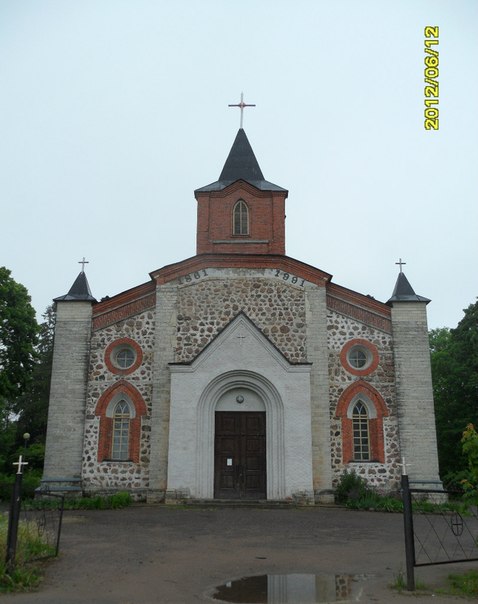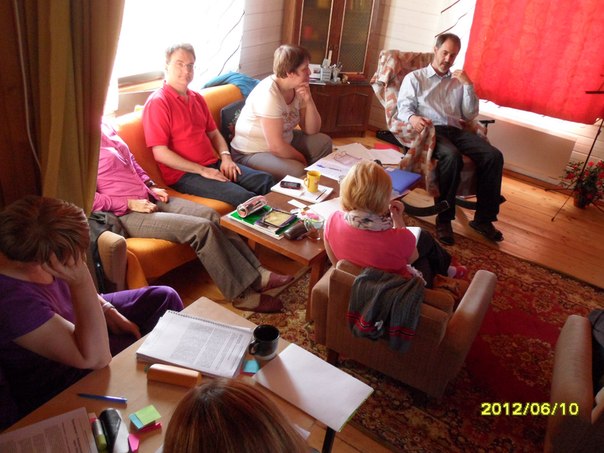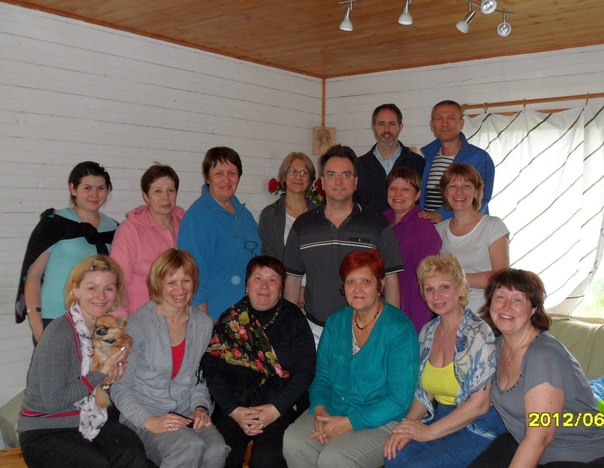This year saw some of the most dramatic and significant transformations in our ministry since coming to Russia in 2007. What our life and my ministry look like going into 2013 are radically different from when we started, but it's not because of any major surprises. It's actually panning out pretty much according to the vision (as I understood it) that God gave in 2006. What is that looking like?
My vision for citywide ministry and transformation became a part of my DNA while in ministry in Richmond, VA from 1997-2007. What changed when I came to Russia was my realization that building a team of citywide leaders from the top down was not the right approach. What God was leading me to do was use my background in counseling and coaching to invest in the personal transformation of people He would bring across my path: yes, leaders, but also simple Christians, and as many orphans as possible too.
This is what I did for our first 5 years: lead trainings that built on the curiosity factor for me as an American, a psychologist, and a trainer. Use these trainings as a means of building relationships, building people, and building trust. At the end of 5 years a good core of about 25 people had seen enough personal change in their lives that they wanted more. God was really good, for the stories of change were amazing and life-altering. Moreover, I didn't expect that there would be so many.
So I announced phase 2: would they be willing to form a group to build team while they continued to grow? Amazingly, almost all of these 25 have continued on over the last several months. As a result, I have shifted my focus from offering new trainings - in part since we have new leaders able to lead the trainings themselves - to investing in the personal growth of each of these new team members and into the development of the group as a group.
For comparison: I logged about 50 sessions of one-on-one mentoring/counseling over the course of the first 6 months of 2011, but 79 trainings and/or consultations with groups or ministries. This reflects my focus at the time on training as a relationship-building tool. Most individual sessions at that time were directly associated with those trainings.
For the last 6 months of 2012, however, the pattern is reversed: over 100 individual meetings (perhaps even a lot more I didn't even bother to record, as they are often spontaneous), and only 35 training sessions.
Until this past spring, I was the only one leading any training (with one exception on one occasion over the 5 years). Since April we have added 5 teacher/trainers who have taught 9 classes. As a result, our outreach to the community encompasses about 75 people currently being taught or ministered to in some way.
We have two people ministering full time: Inna Khan and Rustam (now Roman) Novikov. They are both very bright, eager, teachable, very well respected, and constantly growing themselves leaders. We only need seed money ($5000) to give him a transition until ministry activity can support him largely independently.
Our biggest event of the year was in May when we invited Dr. Ed Smith, founder and head of Theophostic Prayer Ministry to St. Petersburg. He led training for the community at large that our team organized, attracting about 200 in attendance. Then he led a three-day intensive for us and others from around Russia who had already been trained in this powerful form of ministry. Before this event, TPM was barely on the radar screen in Russia. Now it is becoming a recognizable ministry with growing influence.
In addition to the conference, I managed a translation project to get the basic workbook for TPM into Russian (almost 300 pages long!) which went into print early this year. I also had the basic seminar for Peacemaker Ministries translated into Russian, and led that event for the first time in Russia this year. Lastly, I partnered with Communion with God Ministries and had a series of 9 DVD courses translated into Russian. As you can imagine, this was a huge project! That's 11 courses in one year.
Our Orphans Reaching Orphans project has had some setbacks, with 3 people leaving the team, but the 4 of us remaining are re-grouping in 2013. Otherwise, our family ministry to orphan graduates continues. We are most closely working with 3 young people, whom we usually see at least once a week.
Our ministry facility is one of the biggest stories of 2012, so big in fact, that we made a whole video about it. God moved us as a family to a new apartment for New Year's 2012, giving us a new space for ministry, which immediately got used and increased ministry activity dramatically. Most amazing was the willingness of the Russians themselves (normally always looking for freebies) to participate in the big increase in our rent.
My vision for citywide ministry and transformation became a part of my DNA while in ministry in Richmond, VA from 1997-2007. What changed when I came to Russia was my realization that building a team of citywide leaders from the top down was not the right approach. What God was leading me to do was use my background in counseling and coaching to invest in the personal transformation of people He would bring across my path: yes, leaders, but also simple Christians, and as many orphans as possible too.
This is what I did for our first 5 years: lead trainings that built on the curiosity factor for me as an American, a psychologist, and a trainer. Use these trainings as a means of building relationships, building people, and building trust. At the end of 5 years a good core of about 25 people had seen enough personal change in their lives that they wanted more. God was really good, for the stories of change were amazing and life-altering. Moreover, I didn't expect that there would be so many.
So I announced phase 2: would they be willing to form a group to build team while they continued to grow? Amazingly, almost all of these 25 have continued on over the last several months. As a result, I have shifted my focus from offering new trainings - in part since we have new leaders able to lead the trainings themselves - to investing in the personal growth of each of these new team members and into the development of the group as a group.
For comparison: I logged about 50 sessions of one-on-one mentoring/counseling over the course of the first 6 months of 2011, but 79 trainings and/or consultations with groups or ministries. This reflects my focus at the time on training as a relationship-building tool. Most individual sessions at that time were directly associated with those trainings.
For the last 6 months of 2012, however, the pattern is reversed: over 100 individual meetings (perhaps even a lot more I didn't even bother to record, as they are often spontaneous), and only 35 training sessions.
Until this past spring, I was the only one leading any training (with one exception on one occasion over the 5 years). Since April we have added 5 teacher/trainers who have taught 9 classes. As a result, our outreach to the community encompasses about 75 people currently being taught or ministered to in some way.
We have two people ministering full time: Inna Khan and Rustam (now Roman) Novikov. They are both very bright, eager, teachable, very well respected, and constantly growing themselves leaders. We only need seed money ($5000) to give him a transition until ministry activity can support him largely independently.
Our biggest event of the year was in May when we invited Dr. Ed Smith, founder and head of Theophostic Prayer Ministry to St. Petersburg. He led training for the community at large that our team organized, attracting about 200 in attendance. Then he led a three-day intensive for us and others from around Russia who had already been trained in this powerful form of ministry. Before this event, TPM was barely on the radar screen in Russia. Now it is becoming a recognizable ministry with growing influence.
In addition to the conference, I managed a translation project to get the basic workbook for TPM into Russian (almost 300 pages long!) which went into print early this year. I also had the basic seminar for Peacemaker Ministries translated into Russian, and led that event for the first time in Russia this year. Lastly, I partnered with Communion with God Ministries and had a series of 9 DVD courses translated into Russian. As you can imagine, this was a huge project! That's 11 courses in one year.
Our Orphans Reaching Orphans project has had some setbacks, with 3 people leaving the team, but the 4 of us remaining are re-grouping in 2013. Otherwise, our family ministry to orphan graduates continues. We are most closely working with 3 young people, whom we usually see at least once a week.
Our ministry facility is one of the biggest stories of 2012, so big in fact, that we made a whole video about it. God moved us as a family to a new apartment for New Year's 2012, giving us a new space for ministry, which immediately got used and increased ministry activity dramatically. Most amazing was the willingness of the Russians themselves (normally always looking for freebies) to participate in the big increase in our rent.









